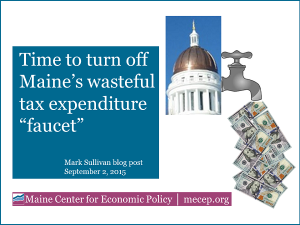One of the most fundamental obligations of the governor and legislature is careful, vigilant stewardship of how the state spends taxpayers’ hard-earned dollars. There are many competing priorities: education for our kids, health care, public safety,  investments in infrastructure for good roads and clean water— the list goes on. It is especially troubling to discover that the state has failed to account for tens of millions of dollars annually, hundreds of millions over the years, of tax giveaways to businesses that promise to deliver new jobs and other needed economic benefits.
investments in infrastructure for good roads and clean water— the list goes on. It is especially troubling to discover that the state has failed to account for tens of millions of dollars annually, hundreds of millions over the years, of tax giveaways to businesses that promise to deliver new jobs and other needed economic benefits.
George Gervais, Department of Economic and Community Development (DECD) commissioner, recently testified to the legislature’s Joint Standing Committee on Government Oversight that DECD “doesn’t have the time or staff to collect data required to measure the effectiveness of the business incentive programs it administers.” A Maine Sunday Telegram editorial labeled as “preposterous” Gervais’ assertion that it “has not been his department’s focus” to hold businesses that benefit from tax giveaways accountable, comparing it to “pounding (the businesses) over the head.”
This validates arguments MECEP has been making for many years, going back at least to the legislature’s Office of Program Evaluation and Government Accountability’s (OPEGA) 2006 report, “Economic Development Programs in Maine — EDPs Still Lack Elements Critical for Performance Evaluation and Public Accountability.”
In February 2010, MECEP urged the Joint Standing Committee on Taxation to support legislation “to design a mechanism to evaluate the impact of each tax expenditure program,” recognizing the 2006 report’s recommendations had yet to be fully implemented.
In a February 2014 blog post, MECEP reported findings from the Center on Budget and Policy Priorities that:
“Maine does not sufficiently scrutinize its business tax expenditures . . . Maine spends more than $11 million a year to give income tax credits or exemptions to companies that buy business equipment, that locate and create jobs in certain designated Pine Tree zones, that perform research on new technology, and whose income falls under foreign jurisdictions (tax havens). These tax giveaways cost Maine’s taxpayers money just like spending for schools or road construction. Yet they receive little or no scrutiny.”
The 126th legislature finally established a Tax Expenditure Review Task Force to examine these programs.
MECEP executive director Garrett Martin, a member of that task force, testified in March 2014 before the legislature’s Joint Standing Committee on Appropriations and Financial Affairs that:
“In a recent review of tax expenditures conducted for [DECD], the Pine Tree Development Zone program was cited as having a negative return on investment. At a minimum, we urge you to subject this program to greater scrutiny and introduce claw-back provisions. Based on the work of the Tax Expenditure Review Task Force, freezing the program for future entrants could save as much as $3.3 million.”
The legislature again failed to act.
As recently as June 2015, MECEP testified before the taxation committee in support of LD 1287, An Act To Ensure That Tax Expenditures Create High-quality Jobs, asserting that the bill:
“. . . would bring transparency, accountability, and enforcement mechanisms to four large economic development incentive programs: the Seed Capital Investment Tax Credit, Pine Tree Development Zone Tax Credits, the New Markets Capital Investment Credit, and Employment Tax Increment Financing. Tax expenditures—especially economic development incentives—deserve the same level of scrutiny and review that all government programs receive to determine their cost effectiveness.”
LD 1287 died in committee.
We agree with the Maine Sunday Telegram:
“The department that hands out tax breaks should want to see the information necessary to tell whether those incentives are working, and the businesses that receive the state money should be happy to participate in any review. Otherwise, the department is just handing out money and hoping it all works out in the end.”
And if it won’t:
“It is now up to the Government Oversight Committee to find a way to change that, and make sure the state’s economic development investments are paying off. Maine can’t afford another nine years of inaction.”
Politicians who decry waste, fraud, and abuse should focus their attention on this blatant mismanagement. It’s past time for the legislature to fix this broken system, demand that recipients of these tax giveaways deliver on the jobs and economic benefits they promised, or turn off the faucet through which Maine taxpayers’ dollars have flowed far too freely for far too long without accountability.


